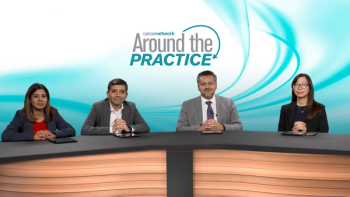Articles by Sham Mailankody, MBBS

Panelists discuss how successful implementation of chimeric antigen receptor (CAR) T-cell therapy in relapsed/refractory multiple myeloma (R/R MM) depends on early referral, coordinated care between academic and community centers, standardized protocols for patient management, and careful consideration of product selection and timing based on individual patient factors.

Panelists discuss how managing a 68-year-old patient with newly diagnosed multiple myeloma (MM) with suboptimal response to Dara-VRd (daratumumab plus bortezomib, lenalidomide, and dexamethasone) requires careful consideration of timing for CAR T referral, product selection, and bridging strategies, while balancing the patient’s preference against standard transplant options in the context of non-high-risk disease.

Panelists discuss how expanding chimeric antigen receptor (CAR) T-cell therapy into earlier treatment lines for multiple myeloma requires careful consideration of patient selection criteria, treatment sequencing strategies, and infrastructure capacity while awaiting additional clinical evidence.

Panelists discuss how successful academic-community partnerships in delivering chimeric antigen receptor (CAR) T-cell therapy for multiple myeloma patients have evolved through shared learning experiences, established communication pathways, and continuous refinement of collaborative care protocols.

Panelists discuss how managing challenges in the chimeric antigen receptor (CAR) T referral process requires addressing key barriers like timely patient identification, insurance authorization delays, and manufacturing coordination while emphasizing the importance of early referrals from community physicians.

Panelists discuss how effective co-management of chimeric antigen receptor (CAR) T patients requires clear communication protocols, standardized handoff procedures, and ongoing collaboration between academic centers and community practices to ensure safe transitions and optimal long-term monitoring.

Panelists discuss how chimeric antigen receptor (CAR) T-cell therapy’s mechanism of action and treatment workflow requires extensive institutional coordination, from patient selection through bridging therapy and infusion, with varied approaches to managing patients during the manufacturing period across different centers.

Panelists discuss how successful chimeric antigen receptor (CAR) T referrals require close coordination between community physicians and treatment centers, involving detailed patient screening, insurance authorization, and careful timing of apheresis and manufacturing to optimize outcomes.

Panelists discuss how patient selection criteria and individual characteristics help determine whether ide-cel or cilta-cel is the more appropriate chimeric antigen receptor T-cell therapy choice for early-line treatment in patients with multiple myeloma.

Panelists discuss how institutional decisions to implement early-line chimeric antigen receptor T-cell therapy for relapsed/refractory multiple myeloma are influenced by patient characteristics, logistical capabilities, cost considerations, and subsequent treatment strategies.

Panelists discuss how the CARTITUDE-4 and KarMMa-3 trials differ in their patient populations, study designs, and outcomes, providing crucial insights for clinicians choosing between cilta-cel and ide-cel chimeric antigen receptor T-cell therapies in relapsed/refractory multiple myeloma.

Panelists discuss how early-line chimeric antigen receptor T-cell therapy studies, including recent data from trials of cilta-cel (Popat et al) and ide-cel (Ailawadhi et al), are showing promising results in patients with relapsed/refractory multiple myeloma, suggesting potential benefits of moving these treatments into earlier therapeutic settings.



